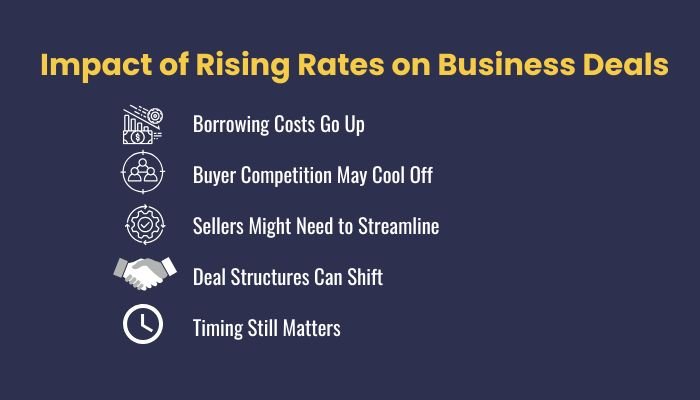What Rising Interest Rates Mean for Business Sales and Acquisitions
Are you thinking about selling your business or acquiring another one? If so, you’ve probably heard rumblings about rising interest rates and wondered if they’ll affect your plans. After all, mergers and acquisitions (M&A) often involve significant financing, making shifting interest rates a factor no buyer or seller can ignore. Below are five key points to keep in mind as you navigate this changing landscape.

Contents
Borrowing Costs Go Up
Rising interest rates typically mean buyers and investors have to pay more to borrow the capital they need for acquisitions. When borrowing costs climb, buyers tend to become more cautious. That doesn’t mean all deals are off the table; it just means businesses with shaky financials might have a tougher time attracting buyers who need substantial loans to close the deal.
On the flip side, if you’re a seller but you own a business with stable revenue and a healthy balance sheet, you’ll likely still catch the eye of serious buyers, even if money is more expensive.
Buyer Competition May Cool Off
In a low-interest-rate environment, it’s common to see multiple buyers vying for the same attractive acquisition targets—driving up valuations and creating a bit of a seller’s market. As interest rates rise, some buyers may decide to hit “pause” and wait for a more favorable financing climate.
This doesn’t necessarily mean your business goes unsold; it could simply reduce the number of bidders at the table. And less competition can mean less pressure for sellers, even though the final sticker price might be influenced by the higher cost of capital.
Sellers Might Need to Streamline
When financing is pricier, buyers focus even more on how quickly the acquired business can deliver returns. As a seller, you’ll want to emphasize your company’s efficiency, profitability, and growth potential. Tightening your operations and showing a steady revenue stream can help justify your asking price—even in a market with rising interest rates.
If buyers see low overhead and strong cash flow, they’ll be more confident in your business’s ability to justify the cost of borrowing.
Deal Structures Can Shift
Remember that mergers and acquisitions aren’t always all-cash deals. In higher-rate environments, you may see more creative deal structures—such as seller financing, earnouts, or equity rollovers—to bridge any differences in valuation.
For instance, if the buyer balks at the price due to higher borrowing costs, they might ask the seller to finance part of the deal over time or tie a portion of the purchase price to the company’s future performance. These arrangements let buyers breathe a bit easier when interest rates are up, while also giving sellers a chance to potentially earn more in the long run.
Timing Still Matters
If you’re thinking of selling, you might wonder whether to do it now or wait for interest rates to swing back down. Market timing is always tricky. Interest rates are just one piece of the puzzle—broader economic conditions, industry trends, and your personal exit goals also matter. In some cases, if your company is in a hot sector or is performing exceptionally well, you might prefer to move now rather than wait (and risk a potential slowdown).
If you’re buying, you may see less competition, which can open opportunities to acquire strong businesses at slightly better terms. The key is clarity about your long-term strategy and risk tolerance.
Making the Best Decision
At the end of the day, interest rates influence M&A deals, but they don’t necessarily halt them. Strong businesses with good fundamentals can still attract quality buyers willing to pay a premium. Meanwhile, buyers with a clear vision and a healthy capital structure can strike attractive deals—sometimes with fewer bidders. If you’re concerned about rising interest rates and what they mean for your plans, talking with an advisor who specializes in mergers and acquisitions is the best way to get practical, tailored advice.
Staying informed will help ensure you’re evaluating opportunities from the right vantage point. When you know what to expect in a rising-rate environment, you’ll be far better equipped to negotiate—and close—the deal that best meets your goals.

Ryan Nead is a Managing Director of InvestNet, LLC and it’s affiliate site Acquisition.net. Ryan provides strategic insight to the team and works together with both business buyers and sellers to work toward amicable deal outcomes. Ryan resides in Texas with his wife and three children.